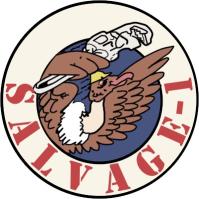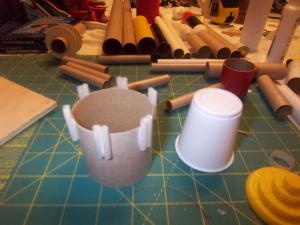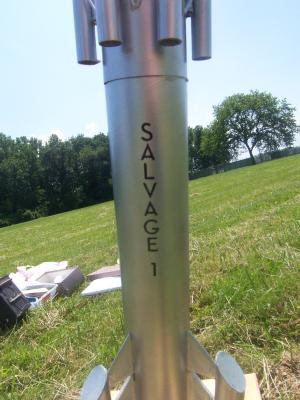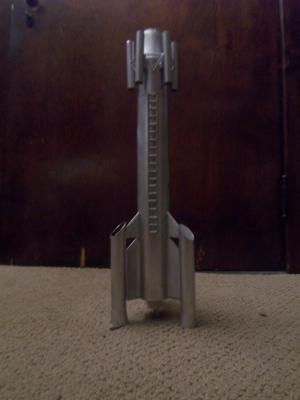Scratch Salvage 1 Original Design / Scratch Built
Scratch - Salvage 1 {Scratch}
Contributed by Dan Bihary
| Manufacturer: | Scratch |

Salvage I
So how do you approach the design of a rocket with a limited amount of parts? I found inspiration in various TV shows and movies such as Flight of the Albatross and Mc Giver. Then I remember a long lost favorite ABC series from the late1970’s. I had my answer, SALVAGE 1!
Here’s the short story…..

Once upon a time, a junkman had a dream...
"I'm gonna build a spaceship, go to the moon, salvage all the junk that's up there, bring it back and sell
it."
So he put together a team. An ex-astronaut...a fuel expert...they built a rocketship...
And they went to the moon. Who knows what they'll do next?
To conserve space, I’ll direct you to a great website with show info: http://www.geocities.com/CapeCanaveral/Launchpad/9782/salvage1.html .
For me the "star" of the show was the rocket ship, Vulture.

So on to my model…..
I probably should first state that there was no way I was going to try to pull off a full blown scale model of the vulture given the part restrictions. So, I did try to do the next best thing. I built a charactature of the Vulture with similar features.
The prototype was built with strapped-on surplus NASA engines, a gas tanker, and a cement mixer as a capsule.
My parts include a large amount of body tubes. I decided on using a length of BT-70. My parts also include a built-up 24mm mount. As far as "strap-on" boosters, my parts also conveniently contained enough 18mm mount to allow the possibility of clustering.

Basic construction techniques were used for the main body. Split fins were employed only toad some interest. The ladder was built in place with CA out of what I think were bamboo skewers.
The capsule was the hardest to build the main part is a piece of the BT-70. The "Shoulder" was made from splitting part of the BT-70 and gluing to the inside. The "nosecone" is made from a small plastic cup. The cub was a slightly smaller diameter than BT-70. Some cardboard tabs were used inside to reinforce the joint.


The capsule boosters are offset from the tube by two launch lugs put together. The struts are toothpicks that are cut into the boosters and flooded with Elmer’s to reinforce. I was a little surprised how strong this ended up being.
A really wanted to include the engine bells but I didn’t receive any card stock. I decide to grab some tubing, cut it, and use a black Brandt nosecone as a mandrel. A couple of minutes with some CA and a disk sander produced an acceptable set of bells.


Final construction included basic shock cord mount typical Estes style.
Since I didn’t get any decal paper, the lettering would prove to be a challenge. The sides of the rocket were base-coated in black. Peel and stick letters were applied. A single coat of silver finished the Vulture. The stick on letters were then removed to reveal the name in black.
Flight Report:
 OK, I’ll admit it! I ran out of time! My flights required me to sneak into one of my favorite
"no rockets allowed" field and get this thing off the ground a couple of times before security asks me to
leave.
OK, I’ll admit it! I ran out of time! My flights required me to sneak into one of my favorite
"no rockets allowed" field and get this thing off the ground a couple of times before security asks me to
leave.
In truth, I really didn’t know how this thing would fly. I was a little concerned about throwing a "D" into the rocket, and blowing all the details right off.
So, I adapted a B into the mount and let it fly. Well, let’s just say it was less than marginal! Well, let’s step it up to a C6-3 and see what happens…. Got some better altitude, but I really wasn’t trying for ground recovery! The good news is no damage!
So let’s grab the D and go for it! But wait, in my hast to launch, The D engines seem to be missing! So much for a successful flight.
But wait, it seems I do have an option. Nah, that would be crazy…. But it might work…….
With encouragement from my son, we loaded up another C6-3, and three more in the outboard motors! I really never envisioned doing this, but what the heck. My clustering experience is exactly zero. I have well over 1,000 launches I’ve supervised but I’ve never plunged into this realm.
So we wired it up, said a prayer to Baby Jesus (ala Talladega Nights), a hit the button. To my surprise we had lift off!
But things were not well. Seems during our quick reload attempts, I didn’t get the capsule put on correctly. The launch rod shall we say "went along for the ride". As you can probably guess, this flight was also less than optimum. But short of losing the launch lug, no major damage happened.
But I was out of time, and sometimes its just better to accept the situation rather push my luck!
In conclusion, this contest was a blast! It really ended up a little harder than I expected, but my son & I had fun. What the heck, maybe it’s time to get that Deuce off the wall!


Sponsored Ads
 |
 |











